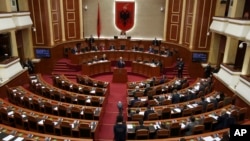Albania's ruling majority says it plans to overrule a presidential veto on a set of controversial government-proposed media laws which were passed December 17 amid an outcry by rights groups and international observers.
Critics of the so-called anti-defamation package, a pair of laws that they say grant an outsize role to Albania's Audiovisual Media Authority (AMA), have long warned the new laws would violate constitutional principles and restrict press freedoms nationwide.
President Ilir Meta largely echoed those concerns when he vetoed the laws on Sunday, saying their passage had "direct and very serious consequences for Albania’s European future.”
The legislation “could place the Albania on the brink of authoritarianism and endanger its [EU] integration and the very existence of democracy in the country,” he wrote in a statement accompanying his decree.
He also chastised Prime Minister Edi Rama's ruling Socialists for failing to publish the laws, which, he said, "constitutes a significant lack of transparency towards the public.”
But Taulant Balla, head of the Socialist majority in Parliament, called Meta’s arguments superficial, suggesting the laws were endorsed by top press freedom representatives at the Organization for Security and Co-operation in Europe (OSCE).
"The version [of this legislative package] approved by Albania's Parliament, was in full agreement with OSCE's Office of the Representative for Freedom of the Media", Balla told VOA, largely echoing similar claims made by Prime Minister Rama.
OSCE officials, however, never endorsed current iterations of the law, and OSCE's top press freedom officials issued a statement on Monday supporting the veto.
"... Nothing in the new legislation should impede the freedom of expression and media freedom," said a statement by Harlem Desir, OSCE's press freedom liaison.
Desir's statement then expressed hopes that the "new reading will allow for further clarification and improvement of the laws to ensure their full compliance with international standards and OSCE commitments."
Faced with a veto, Albanian lawmakers must now decide whether to accept Meta's verdict and rewrite the law or dismiss it by simple majority.
Speaking with VOA's Albanian Service on Wednesday, Balla said although legislators will submit Meta's decree for parliamentary review, "our will as majority is to stick to the December 17 document agreed upon with OSCE.
Widespread skepticism
Tirana-based journalists and international press freedom watchdogs have long warned that the laws are designed to muzzle free speech and news reporting.
"Albanian President Ilir Meta should see the country’s proposed media laws for what they are: a giant blow to press freedom,” said the New York-based Committee to Protect Journalists said last year, and Paris-based Reporters Without Border's expressed full support for the veto on Monday.
On Wednesday, the International Federation of Journalists commended Meta’s decision to veto, “stressing that anti-defamation laws must not be used as tools to restrain press freedom.”
According to the new laws, Tirana's media regulatory body, the AMA, can levy hefty fines against online media outlets accused of damaging a person's reputation or infringing on their privacy before the outlets can elect to have the case heard in a court of law.
In most countries, such adjudicatory powers — the review of evidence, argumentation and legal reasoning for determining rights and obligations of the parties involved — are typically restricted to the courts.
'An embarrassment'
Albanian writer and free speech advocate Fatos Lubonja, who spent 17 years imprisoned in the country's Communist-era labor camps for entries in a diary that was confiscated by police, said the impact of the new laws are already palpable in the country fragile media environment.“
You can see it in the conflict of interests of media owners who need to protect their business interests," he told VOA.
"It has become increasingly impossible to grow or maintain a business without the government’s support," he said. "The government, with its economic capture, exerts pressure on their other product: information."
The vacuum created by Albania's ever-dwindling space for free expression and independent reporting, as documented by various international rights groups, is increasingly being filled by state propaganda or politically co-opted private outlets, such as Prime Minister Rama's own online TV Channel, ERTV, through which Rama makes statements and publicizes government activity.“
All this noise has one upside only: it is publicity for ERTV," Rama said while defending the controversial media legislation last month.
"For the Prime Minister to open a TV channel from his office where he not only generates news as he wishes, but also distributes it to other private and public televisions,” Lubonja said, "“is one of the biggest scandals and an embarrassment for Albania."
Rama’s office did not respond to VOA’s request for comment.
Backers of the law say they would regulate a crowded online publication marketplace while fighting "fake news" — a term some Albanian government officials have used to describe factual reporting that is critical of their work.
Reporters see the laws as a continuation of the ruling party’s efforts to control the media.
Mimoza Picari contributed reporting from Tirana, along with Ilirian Agolli. Keida Kostreci reported from Washington. This story originated in VOA's Albanian Service.




